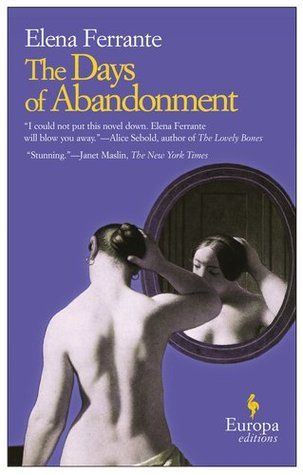 If Italian author Elena Ferrante knows about #FerranteFever, the social media hashtag used by fans to describe their obsession with her books, I’d be willing to bet the phenomenon makes her uncomfortable. Possibly, she’s rolled her eyes about it. That’s because, in this age of selfies and shameless self-promotion, Ferrante is something of an iconoclast, eschewing all public appearances and social media, granting few interviews, and fiercely guarding her true identity (Elena Ferrante is a pen name).
If Italian author Elena Ferrante knows about #FerranteFever, the social media hashtag used by fans to describe their obsession with her books, I’d be willing to bet the phenomenon makes her uncomfortable. Possibly, she’s rolled her eyes about it. That’s because, in this age of selfies and shameless self-promotion, Ferrante is something of an iconoclast, eschewing all public appearances and social media, granting few interviews, and fiercely guarding her true identity (Elena Ferrante is a pen name).
In a rare interview with the author in the spring 2015 issue of the Paris Review, Ferrante declares herself “still very much interested in testifying against the self-promotion obsessively imposed by the media. This demand for self-promotion diminishes the actual work of art, whatever that art may be, and it has become universal.” She then goes on to explain the creative space that opened up for her when she realized that her anonymity would be protected by her publishers. “[It] made me see something new about writing,” she says. “I felt as though I had released the words from myself.”
The interview gave me pause, and, as someone who’s ambivalent toward social media, I found Ferrante’s views refreshing. It’s commonly accepted that everyone who’s anyone needs to have an online presence. But here’s a woman who doesn’t care what everyone else is doing; she’s not convinced. Ferrante does, of course, have an online presence—a website presumably maintained by somebody else (sans author photo), and the countless public-forum conversations among her readers—but Ferrante herself seems to have washed her hands of the whole business, and it has done nothing but improve her writing.
But that doesn’t mean #FerranteFever isn’t real. However much it may seem like a ploy devised by the publisher, Europa Editions, or a grown-up version of literary Belieberism, what it describes is in fact a kind of enchantment, a gauzy delirium that descends while reading Ferrante’s novels. I know because I’ve caught it.
I contracted it at work, where I catch most things, colds and enchantments alike. Such are the benefits and hazards of working at a public library. In the stacks one evening, I discovered a slim volume, The Days of Abandonment. I began reading it the following morning, my day off, and—laundry be damned!—I couldn’t stop. Within a few weeks, I’d consumed everything Ferrante has written, including her densely populated Neapolitan novels. Like the rest of her devoted readers, I’m now counting days until September, when the fourth Neapolitan book is scheduled for release.
It’s difficult to say precisely why Ferrante’s novels are so deeply affecting. That Ferrante is a masterful writer is plain—and recognition is due also to the brilliant English translations by Ann Goldstein. But trying to explain why Ferrante’s books are spellbinding would be like trying to explain what is magical about Bach’s Sixth Brandenburg Concerto. There’s something numinous in her apparently straightforward, elegant prose. She’s not a tricky writer, presenting readers with a basket of puzzle pieces to fit together; she doesn’t rely on literary cleverness. There is a kind of purity in her writing, an intensity. Reading Ferrante is like following a crackling fuse with your eyes; each line of text burns across the page.
But it isn’t just the writing that drives Ferrante’s stories, it’s her willingness to examine an individual’s interior life. I read a lot of books, but Ferrante’s stand out to me for their honesty, and it strikes me as an honesty that is hard won. In the Paris Review interview, Ferrante quotes Leda, her protagonist in The Lost Daughter. “ ‘The hardest things to talk about are the ones we ourselves can’t understand.’ It’s the motto—can I call it that?—at the root of all my books.” Ferrante’s brand of honesty isn’t merely the art-as-mirror acknowledgment that brutality and heartbreak exist in the world, but an investigation into their individual origins and impacts. The Neapolitan novels, for example, are a sweeping examination of a complicated friendship at the center of two women’s lives, which, for better or worse, affects every decision they make.
At a time when much of contemporary American literary fiction seems to be moving away from this kind of deeply personal writing and toward the fantastical and bizarre, Ferrante’s approach to literature is life-affirming. She celebrates what it is to have a human heart, the rawness and apathy and rage, as well as the brief, transcendent moments of happiness.
 E. D. Watson is Newfound’s Blog Editor. A writer by day and a library clerk by night, her stories have appeared or are forthcoming in Bodega, [PANK], Narrative, and THIS., among other publications. She eats cheddar-and-mayonnaise sandwiches when no one is looking.
E. D. Watson is Newfound’s Blog Editor. A writer by day and a library clerk by night, her stories have appeared or are forthcoming in Bodega, [PANK], Narrative, and THIS., among other publications. She eats cheddar-and-mayonnaise sandwiches when no one is looking.


2 comments on “Catching #FerranteFever”